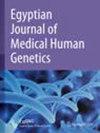在一个伊朗大家族中鉴定出可能导致非综合征性听力损失的 CDH23 新型致病变体和 OTOGL 新型变体
IF 1.1
Q4 GENETICS & HEREDITY
引用次数: 0
摘要
感音神经性听力损失(SNHL)是一组临床和基因异质性的听觉系统疾病。感音神经性听力损失可作为症状出现在 400 多种综合征中,150 多种基因的突变可导致感音神经性听力损失。GJB2 和 GJB6 基因突变是全球 SNHL 最常见的病因之一。Cadherin 23(CDH23)基因突变可导致Usher综合征和/或非综合征性听力损失(NSHL)。本研究利用全外显子组测序(WES)检测了一个有两名患者的伊朗近亲结婚大家庭的听力损失病因。所有家族成员都接受了全面的基因型-表型相关性评估和共分离分析,以了解家族内的遗传模式。候选变体通过桑格测序得到进一步确认。此外,还进行了硅分析,以预测变异体的功能影响;对变异体的解释符合美国医学遗传学会(ACMG)的指南。WES结果发现了两个新变异,一个是CDH23(c.2961T > G)中的同位错义变异,另一个是OTOGL中的杂合剪接位点变异,这两个变异符合常染色体隐性遗传模式。生物信息学研究证实了新变异的致病作用。c.2961T > G变异被归类为可能致病。CDH23的新型变异是先天性深度进行性HL的病因。第二个家族没有样本,无法区分哪个变异体导致了该病的分子病理学。建议进一步开展研究和功能检查,以调查 OTOGL: c. 1863-1G > T 在耳聋中的作用。本文章由计算机程序翻译,如有差异,请以英文原文为准。
Identification of novel likely pathogenic variant in CDH23 causing non-syndromic hearing loss, and a novel variant in OTOGL in an extended Iranian family
Sensorineural hearing loss (SNHL) is a clinically and genetically heterogeneous group of disorders of the auditory system. SNHL can occur as a symptom in more than 400 syndromes, and mutations in more than 150 genes can lead to SNHL. Mutations in the GJB2 and GJB6 genes are among the most common causes of SNHL worldwide. Mutations in Cadherin 23 (CDH23) can cause Usher syndrome and/or non-syndromic hearing loss (NSHL). In this study, the Whole Exome Sequencing (WES) was used to detect the cause of hearing loss in a large consanguineous Iranian family with two patients. All family members underwent a thorough Genotype–phenotype correlation assessment and co-segregation analysis to understand the inheritance pattern within the family. The candidate variants were further confirmed by Sanger sequencing. In addition, in silico analysis was performed to predict the functional impact of the variants; the interpretation of the variants was performed in accordance with the American College of Medical Genetics (ACMG) guidelines. WES results identified two novel variants, a homozygous missense variant in CDH23 (c.2961T > G) and a heterozygous splice site variant in OTOGL that was compatible with the autosomal recessive pattern of inheritance. Bioinformatics studies confirmed the pathogenic effects of novel variants. The c.2961T > G variant was classified as likely pathogenic. The novel identified variant in the CDH23 was the cause of congenital profound progressive form of HL. Samples were not available from the second family to distinguish which variant is responsible for the molecular pathology of the disease. Further studies and functional examinations are suggested for investigating the role of OTOGL: c. 1863-1G > T in deafness.
求助全文
通过发布文献求助,成功后即可免费获取论文全文。
去求助
来源期刊

Egyptian Journal of Medical Human Genetics
Medicine-Genetics (clinical)
CiteScore
2.20
自引率
7.70%
发文量
150
审稿时长
18 weeks
 求助内容:
求助内容: 应助结果提醒方式:
应助结果提醒方式:


